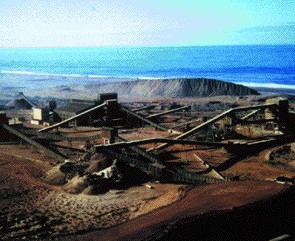|
South Africa Politics | Economy - Development SA considers nationalising mines
South Africa's ruling ANC party has been under pressure from the party's left wing to consider a full nationalisation of the country's dominant mining sector. But Minister Trevor Manuel early made it clear that only a softer degree of state involvement in the sector would be considered.
At that stage, the Chamber of Mines, whose members are "emphatically opposed to the nationalisation of the country's mines," were relieved by Minister Manuel's intervention. "Minister Manuel correctly draws attention to the prohibitive costs of nationalisation and places doubt on the legitimacy of using taxpayers' money to fund the acquisition of mines," the Chamber said in a statement. "Nationalisation has not worked in any country in the world and neither will it work in South Africa. History is littered with numerous examples, several of them in Africa, of how nationalisation has impoverished countries," according to the South African Chamber of Mines. "Zambia's nationalisation of its copper mining industry in 1972 is just one African example of the debilitating effects of nationalisation. Within two decades of the government taking ownership of its copper mines, Zambia's levels of copper production plunged to less than half the pre-nationalisation level," the Chamber added, welcoming Minister Manuel's call for more research. While the decision on a possible nationalisation of South Africa's mining industry effectively has been put off for two years, the ANC's left wing - including the Communist party, the powerful COSATU trade union and the radical Youth League - has announced it will continue to fight for a full nationalisation. COSATU spokesperson Patrick Craven said nationalisation would be necessary to counter "the massive job losses in the mining sector." Mining is a major contributor to South Africa's GDP, with precious metals contributing over 60 percent to the country's mineral export earnings. The mining industry is also the country's biggest employer, with around 460,000 employees and another 400,000 employed by the suppliers of goods and services to the industry, according to government. By staff writers © afrol News - Create an e-mail alert for South Africa news - Create an e-mail alert for Politics news - Create an e-mail alert for Economy - Development news
On the Afrol News front page now
|
front page
| news
| countries
| archive
| currencies
| news alerts login
| about afrol News
| contact
| advertise
| español
©
afrol News.
Reproducing or buying afrol News' articles.
You can contact us at mail@afrol.com









